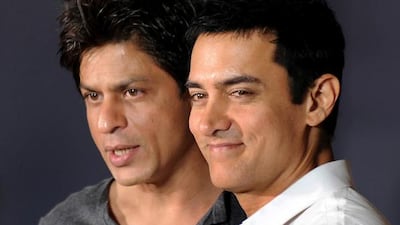Mumbai // A furious backlash against two Bollywood stars who complained of rising intolerance in India has highlighted the film industry’s uneasy relationship with politics, in contrast to Hollywood where celebrities are often lauded for their activism.
Top actors Aamir Khan and Shah Rukh Khan were accused of being unpatriotic after suggesting Hindu-majority India was becoming more intolerant, with members of the ruling Bharatiya Janata Party (BJP) leading the onslaught.
“We have these highly polarised and heated responses to any political stand a film personality takes,” movie director Hansal Mehta said.
“There is no room for debate or discourse, especially when it comes to Bollywood celebrities,” he added.
Aamir – the star of Dhoom 3, one of the highest-grossing Bollywood movies of all time – provoked a furious response when he said that a sense of "insecurity" and "fear" was gripping India.
Aamir, who like many Bollywood stars is Muslim, also revealed that his Hindu wife had even questioned whether the couple should leave the country.
BJP spokesperson Shahnawaz Hussain warned Aamir it was “not all right to malign” India and told the actor: “Don’t forget, India made you a star.”
-------------------------------
Is Aamir Khan right or wrong? What the celebs are saying on Twitter
-------------------------------
Television footage showed dozens of activists burning posters of Aamir in several Indian cities, while police protection at his Mumbai home was upgraded and social media was awash with criticism of the star.
The 50-year-old was the latest in a series of high-profile figures from the arts world to raise concerns about religious and cultural intolerance since Hindu nationalist prime minister Narendra Modi was elected last year.
Few of these were film stars. However, fellow Bollywood icon Shah Rukh Khan sparked a similar furore earlier in November when he referred to “extreme intolerance in India” after the lynching of a Muslim man in October over rumours he had eaten beef.
Senior BJP leader Kailash Vijayvargiya accused Shah Rukh, one of India’s most top actors, of being “anti-nationalist” and said the actor’s “soul is in Pakistan” in a series of tweets he later retracted.
The rows were a rare foray into political comment for Bollywood celebrities, who usually remain quiet for fear of damaging their film prospects. If they do speak up, it is to pander to the ruling party.
"The fault lies somewhere in the Bollywood system," said Mehta, director of popular hits Shahid and CityLights.
“We want to hobnob with politicians and be extremely diplomatic. We don’t take a stand, and this is reflected in our films which are populist in their discourse.
“People can have political opinions in private, but in public they want to be in favour and this is often because of fear of a backlash,” he added.
In marked contrast, many Hollywood idols such as George Clooney and Susan Sarandon have voiced support for numerous issues, including climate change and human rights, without having their patriotism questioned.
-------------------------------
‘Intolerance’ creates fear in Aamir Khan
-------------------------------
For social commentator Santosh Desai, the angry response equated to the level of hysteria with which Bollywood stars are idolised across India.
"Instead of focusing on the point Khan has made, people are attacking his films, discussing his marriage and downgrading the app for the brand he endorses," he told The Times of India newspaper.
“At one level, this shows the disproportionate response India has to celebrities – it’s either complete adulation and deification or absolute vilification,” Mr Desai said.
Bollywood has not always shied away from tackling politics in its films, leading to run-ins with the government of the day.
In 1977 a satire on Indian politics called Kissa Kursi Ka (The Story of the Chair) was banned by the then-ruling party.
Aandhi (Storm) was also banned two years earlier as it was allegedly based on the life of then-prime minister Indira Gandhi. It was later released.
Bollywood and Indian politics have sometimes intertwined. Actor Amitabh Bachchan was briefly a Congress MP, but Vir Sanghvi – a columnist with the Hindustan Times – says the relationship "has nothing to do with politics and everything to do with threats".
“Bollywood stars pander to those who threaten them. They are scared of people who might disrupt their cinema screenings or organise demonstrations against them,” he said.
* Agence France-Presse

